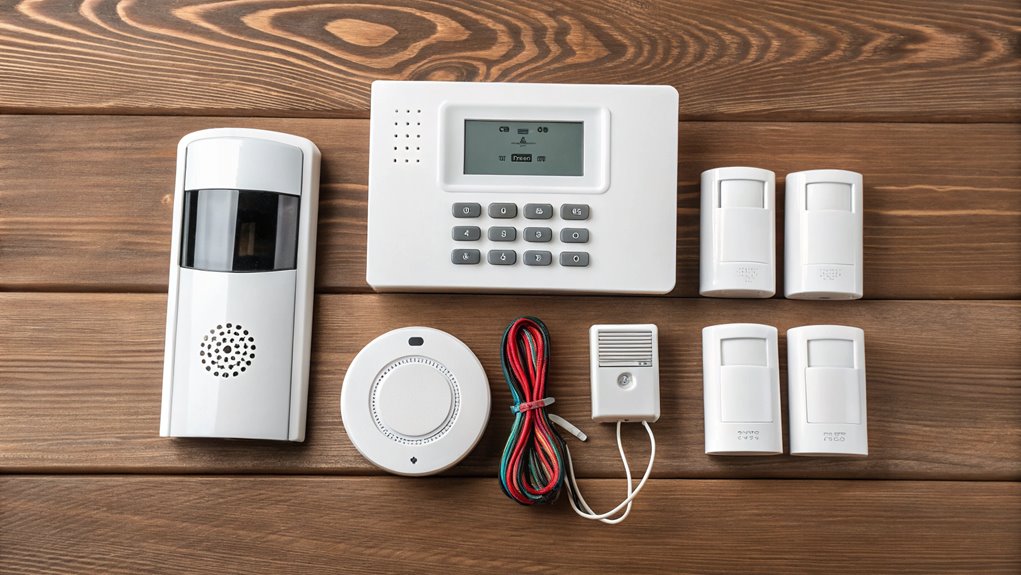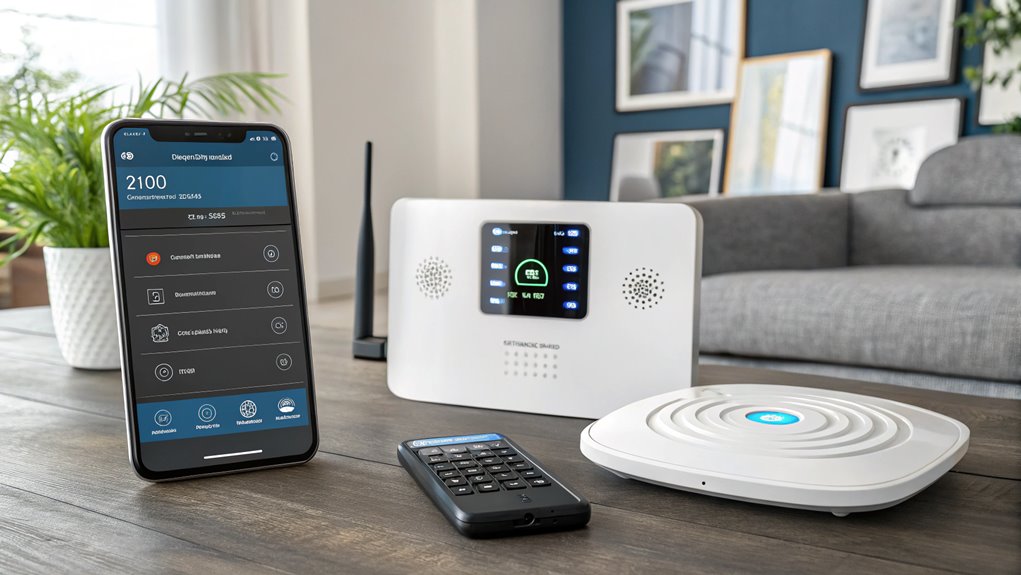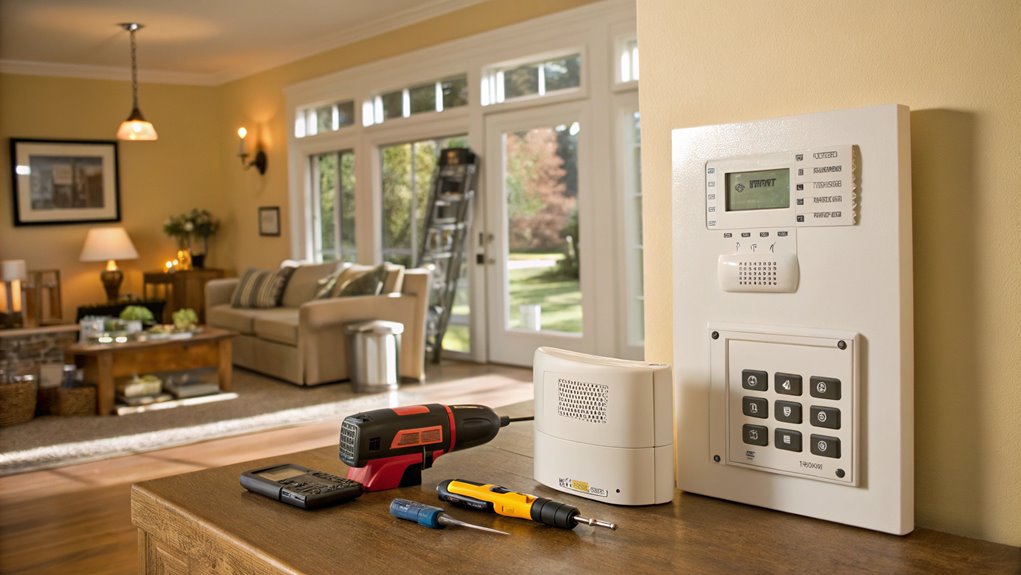Home alarms are key to keeping your home safe, and they work by combining several important parts. You've got the control panel, which acts like the brain of the system, along with sensors that detect movement or broken glass. When something's wrong, an alarm blares, letting everyone know there's trouble. Plus, alarm systems often send alerts to your phone or a monitoring service that can call for help. Regular maintenance and updates are essential to keep everything working smoothly. So, if you want to dig deeper into how each part works together, there's plenty more to explore!
Components of Home Alarm Systems

Home alarm systems typically consist of several key components that work together to protect your property.
First, you've got the control panel, which acts like the brain of the system, allowing you to manage everything from arming and disarming to monitoring alerts.
Then, there are the sensors—these detect movement or unauthorized entry. You might find door and window sensors, motion detectors, and even glass break sensors as essential alarm system components. Glass Breakage Alarm is designed to effectively detect vibrations from glass impact or breakage, emitting a loud siren.
Next up are the security cameras. They help you keep an eye on your property, whether you're home or away, by capturing video footage.
Another important feature is the alarm siren, which sounds when a breach occurs, alerting you and your neighbors that something's wrong.
Finally, a monitoring service can connect your system to emergency responders, ensuring help arrives quickly if needed.
The Door Stop Alarm offers a compact and cost-effective solution, providing an additional layer of security with its loud 120dB alarm to deter intruders.
By understanding these security system features, you can better appreciate how each part plays a significant role in keeping your home safe.
Investing in a reliable alarm system gives you peace of mind, knowing you've got an extra layer of protection against potential threats.
Types of Alarm Sensors
A variety of alarm sensors play crucial roles in enhancing your home security. Each type works together to keep you safe, alerting you to potential dangers.
One of the most common types is motion detectors. These sensors use infrared technology to spot movement in your home, so if someone—or something—crosses their path, you'll get an instant alert. Imagine being at home and knowing that any unusual movement triggers a warning; it's a real game changer for your peace of mind!
Another critical sensor is the glass breakage sensor. This one's designed to detect the sound of breaking glass, which is often a sign of a break-in. If someone were to smash a window, this sensor picks up the sound and triggers your alarm, giving you a heads-up before things escalate.
When you combine motion detectors with glass breakage sensors, you create a powerful defense system. It's like having an invisible shield around your home, keeping unwanted intruders at bay. Additionally, using a personal burglar alarm like the 2n1 can enhance your security by providing immediate alerts in case of unauthorized access.
Communication Methods

How do alarm systems communicate with you and emergency services when a threat is detected? Communication methods are essential for ensuring your safety. Most home alarms rely on wireless technology to transmit signals. When a sensor detects an intruder, it sends a signal through the air to the control panel. This is where the magic happens!
Here's a quick look at the main communication methods:
| Method | Description |
|---|---|
| Cellular Communication | Uses cell towers to send signals, even if the landline is cut. |
| Wi-Fi Communication | Connects through your home internet, providing instant alerts. |
| Radio Frequency | Sends signals over radio waves, offering reliable coverage. |
| Smartphone App Alerts | Notifies you directly to your phone, helping you stay updated. |
Each of these methods uses signal transmission to alert you and the emergency services. With these systems in place, you can feel more secure knowing that help is just a signal away. So, whether you're at home or out and about, your alarm system keeps you connected and informed!
Monitoring Services Explained
Monitoring services play an essential role in the effectiveness of alarm systems, ensuring your safety around the clock. When you choose a home alarm system, you usually get different monitoring options. These options can range from self-monitoring, where you handle alerts, to professional monitoring, where trained operators keep an eye on your home 24/7.
With professional monitoring, you can relax, knowing that someone is always ready to respond. Response protocols are critical in these services. If your alarm goes off, the monitoring center will quickly check in with you to confirm whether it's a real emergency.
If you don't respond, they'll follow their established protocols, like contacting the police or dispatching security. This swift action can be the difference between a minor incident and a serious situation.
Ultimately, having a reliable monitoring service adds an extra layer of security to your life. It helps you feel more secure in your home, knowing that trained professionals are just a call away.
Installation and Maintenance Tips

When setting up your home alarm system, proper installation is essential for ideal performance. You want to make certain everything works perfectly to keep your home safe. Start by choosing the right wiring techniques. If you're not comfortable with the wires, don't hesitate to call a professional. They can guarantee your system is properly connected and won't fail when you need it most.
Next, think about your system upgrades. Technology changes fast, and new features can help enhance your security. Regularly check for software updates and consider adding smart home integrations, like cameras or motion detectors. These upgrades can really boost your protection.
Don't forget about maintenance! Test your system monthly to make sure it's functioning correctly. Replace the batteries in your sensors and check for any loose connections. Keeping your system in top shape is key to deterring intruders.
Lastly, always keep an eye on the latest trends in home security. You never know when a new gadget or feature could make your home even safer. Remember, your safety is the most important thing, so stay proactive!
Answers to Common Questions
Can Home Alarms Be Integrated With Smart Home Devices?
Yes, home alarms can be integrated with smart home devices. You'll find that many systems offer smart integration and device compatibility, allowing you to control everything seamlessly from your smartphone or smart hub.
How Do I Choose the Right Alarm System for My Needs?
To choose the right alarm system, consider the various alarm types available and evaluate your budget considerations. Assess your security needs, desired features, and installation preferences to find the perfect fit for your home.
What Happens if the Power Goes Out?
Imagine a lighthouse guiding ships through a storm. If the power goes out, your alarm system's battery backup keeps it shining. This guarantees system reliability, protecting your home even when darkness tries to creep in.
Are There Any Legal Requirements for Installing an Alarm System?
You'll need to check local alarm regulations before installing your system. Many areas require installation permits, so make certain you're compliant to avoid fines and guarantee your alarm operates effectively within legal guidelines.
How Can I Test My Home Alarm System Regularly?
You know, testing your alarm system's not just for thrill-seekers! Regular alarm testing keeps you safe. Follow maintenance tips like checking batteries monthly and simulating alarms to guarantee everything's working. Who knew safety could be so fun?
Bottom Line
So, when it comes to keeping your home safe, having a solid alarm system is like having a trusty guardian by your side. With the right components, sensors, and monitoring services, you can sleep a little easier at night, knowing you've done your part to protect your space. Plus, with some simple installation tips, you can get everything up and running smoothly. Remember, safety isn't just a luxury—it's something we all deserve, so don't wait to get started!




